World Pancreatic Cancer Day
Pancreatic cancer is one of the leading causes of cancer-related deaths around the world. Yet the public awareness of this aggressive malignant tumour is extremely low. Declaration of a day dedicated to pancreatic cancer is aimed not only at raising awareness of this disease, but also at pancreatic cancer being pushed through among cancer research priorities. Therefore, for the first time ever, 13 November marks the World Pancreatic Cancer Day.
Pancreatic cancer accounts for approximately 2% of all newly diagnosed cancers, and causes about 6% of all cancer-related deaths. Prognosis of this disease is rather poor. Despite every effort, the 5-year survival rate of pancreatic cancer patients only amounts to 5%. Treatment results are rather poor in all economically developed countries, and it is high time to declare a “state of emergency”. According to expert estimates, pancreatic cancer will become the second most common cause of cancer-related deaths in Europe by 2030. As for the Czech Republic, pancreatic cancer incidence rates have doubled since the 1980s.
“At present, there is no specific test which would make it possible to diagnose pancreatic cancer at an early stage, and the disease typically develops quietly, without any significant symptoms. This is the reason why pancreatic cancer patients are mostly diagnosed too late, when the advanced stage of the disease rules out a radical surgical removal of the tumour, which is the only potentially curative method among all treatment options,“ explained Professor Zdenek Krska, senior consultant at the 1st Department of Surgery of the General University Hospital in Prague.
Reduction of risk factors is important
Several known risk factors can contribute to the development of pancreatic cancer. “Approximately 25% of cases are linked to smoking. People should also avoid excessive alcohol consumption; being overweight is another risk factor for pancreatic cancer. People with a history of chronic pancreatitis are also at a higher risk of the disease,” said Professor Lubos Petruzelka, senior consultant at the Department of Oncology of the General University Hospital in Prague.
Symptoms of pancreatic cancer
Clinical symptomatology is mostly inconspicuous and unspecific; symptoms of the disease frequently appear in late stages, after the tumour has spread into adjacent tissues. Symptoms of pancreatic cancers might involve:
- pain in the stomach area or back
- anorexia
- inexplicable weight loss
- nausea
- jaundice (non-infectious)
- change in stool colour or consistency (clayish)
- recurring phlebitis
- newly developed diabetes mellitus type II
- depressive disorder, which might precede development of the disease
Czech pancreatic cancer incidence rates rank 1st worldwide
According to the latest figures released by IARC [1], Czech pancreatic cancer incidence rates rank 1st both in Europe and worldwide (Fig. 1). Czech pancreatic cancer mortality rates nowadays rank 3rd globally and 2nd in Europe, when taking both sexes into account (Fig. 2). According to an expert estimate by the Institute of Biostatistics and Analyses of Masaryk University (IBA MU) [2], almost 2,300 new cases of pancreatic cancer will be diagnosed in 2014, and almost 1,300 of them will be diagnosed at an advanced stage, with metastases to other organs.
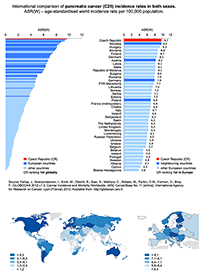 |
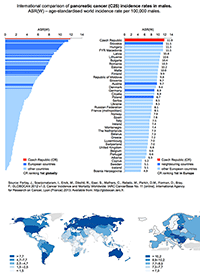 |
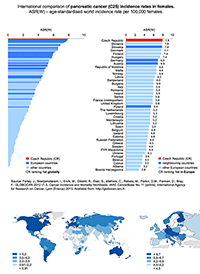 |
|
Figure 1: International comparison of pancreatic cancer incidence rates. |
||
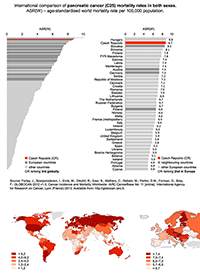 |
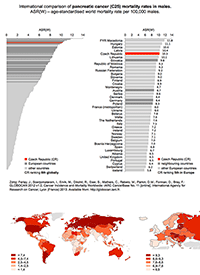 |
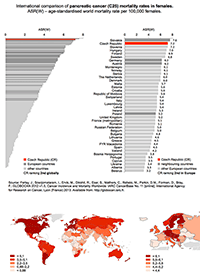 |
|
Figure 2: International comparison of pancreatic cancer mortality rates. |
||
Alarming incidence and mortality rates for pancreatic cancer have led to the establishment of a new European initiative, which aims to unite pancreatic cancer experts, policymakers, patients and other stakeholders, who will follow the common objective of raising awareness of pancreatic cancer, and pushing it through among cancer research priorities.
Physicians’ priorities in the area of pancreatic cancer for the period 2014–2016
- Raising public awareness of pancreatic cancer:
- Developing a document containing 10 key facts about pancreatic cancer
- Developing a “manifesto” about pancreatic cancer
- Developing an expert “pressure” aiming to refocus the EU in favour of pancreatic cancer research projects
- Improving and interconnecting nationwide registries focused on pancreatic cancer
- Improving early diagnosis of pancreatic cancer:
- Developing a diagnostic manual (for physicians)
- Defining 10 “warning signs” of pancreatic cancer (for the public)
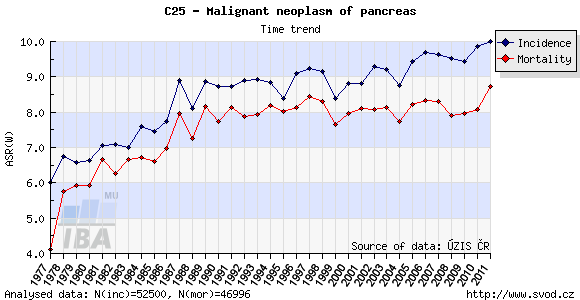
Figure 3: Pancreatic cancer incidence and mortality rates in the Czech Republic (both sexes), ASR-W. Data source: CNCR [3].
Reference
- Ferlay, J., Soerjomataram, I., Ervik, M., Dikshit, R., Eser, S., Mathers, C., Rebelo, M., Parkin, D.M., Forman, D., Bray, F.: GLOBOCAN 2012 v1.0, Cancer Incidence and Mortality Worldwide: IARC CancerBase No. 11 [online]. International Agency for Research on Cancer, Lyon (France) 2013. Dostupný z WWW: http://globocan.iarc.fr.
- Dušek, L., Vyzula, R., Melichar, B., Abrahámová, J., Fínek, J., Petruželka, L., Vorlíček, J.: Číselné podklady pro plánování nákladů léčebné péče v onkologii – analýzy dostupných populačních dat a predikce pro rok 2014 [article in Czech]. In: Modrá kniha České onkologické společnosti. Brno: Masarykův onkologický ústav, 2014. 254–297. ISBN 978-80-86793-35-1.
- Institute of Health Information and Statistics of the Czech Republic: Czech National Cancer Registry (CNCR) [26. 11. 2014]. Available from WWW: http://www.uzis.cz/registry-nzis/nor
Keywords: pancreatic cancer, World Pancreatic Cancer Day
13. 11. 2014 General University Hospital in Prague: Press Release



